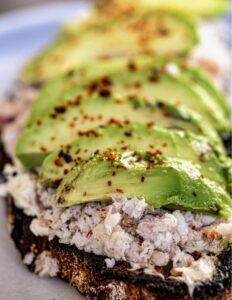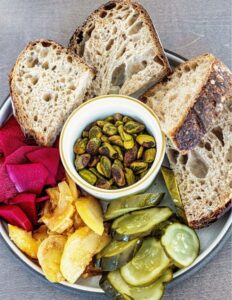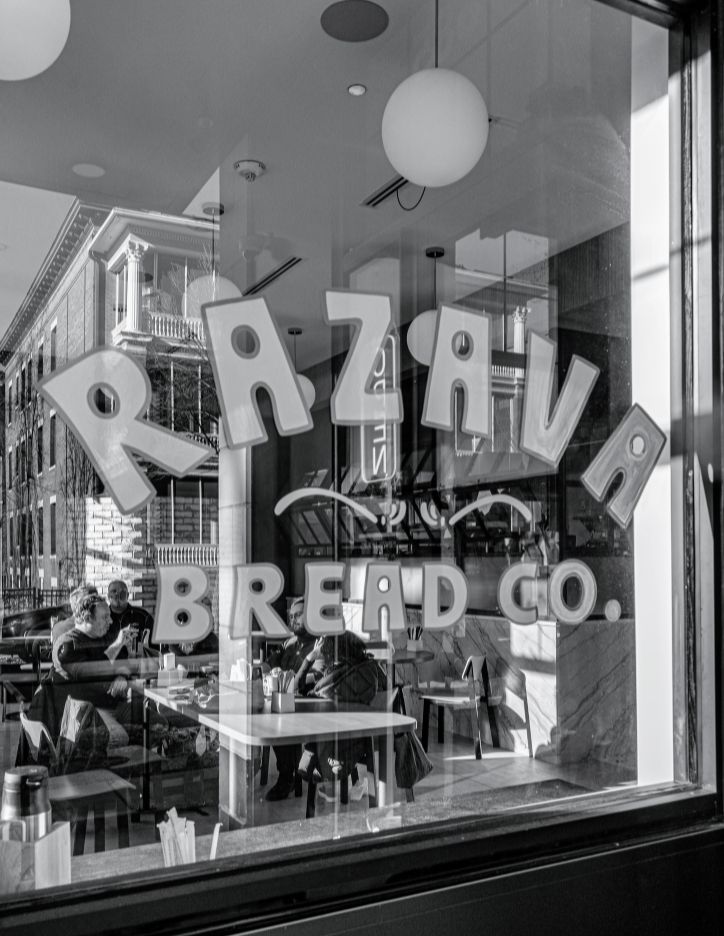A kosher restaurant owner once told me that it’s not enough just to be a kosher restaurant; since the Twin Cities doesn’t have the population of kosher-keeping Jews to keep it operating, it has to be a good restaurant that happens to be kosher.

Razava’s Roasted Tomato on sourdough. (Photo by Ethan Roberts/JCRC)
The mid-December opening of Razava Bread Co. in St. Paul aimed to meet this goal, and after one shared meal with friends and colleagues, it’s certainly on the way to hitting the mark.
It wasn’t all perfect, but there’s even good news in the downside: the staff knows what’s coming up short and are working to fix the issues.
For one, the bagels – New York and Jerusalem – were sold out. Even the stockpile they keep in the kitchen to serve up with the plates (as opposed to getting a single bagel from the display behind the counter) was gone. The moral of the story – don’t show up at 12:30. However, operations manager Alex Baldinger said earlier this week that the baking team is working on ramping up production to meet the demand.
One of the other things was that the egg in the shakshouka was overdone, as opposed to the runny egg you’d expect. We offered that maybe it was our fault for not eating it right away; we were told that it had nothing to do with us. Again, GM Loren Bunjes knows the issues and the team is working to remedy them. I have hope.
Now the good news. Not surprisingly, five Jews sitting at a table with a lot of food means that opinions and tastes will vary. But everything we tried was really well done.

Whitefish on sourdough with avocado and aleppo chili flakes. (Photo by Ethan Roberts/JCRC)
Both fish plates were excellent, and incredibly different. The whitefish, the more mild of the two, is served on the miche bread with a house schmear, and topped by sliced avocado and aleppo chili flakes. Before purists scoff at the avocado – don’t. It totally works and compliments the rest of the plate. The smoked mackerel is served on sourdough with a ricotta spread and topped with pickled relish, which ads crunch and acid to help offset the more aggressive fish taste.
The shakshuka (egg notwithstanding) was well-spiced and tasted like it was simmered for 18 hours (it was). I’m eager to try again once the egg cookery gets sorted. The sabich in the house-made pita was egg-forward (which worked for me not being a huge eggplant fan), and everything was properly seasoned. It seems simple, but it’s not always a given.
The roasted tomato plate, Razava’s version of the Spanish staple pan con tomate, was also great. It’s a very simple dish of roasted Campari tomatoes, garlic, olive oil, and black pepper, but really well executed. The labneh with za’atar and olive oil was bright with

Zippora’s Pickle Plate (Photo by Ethan Roberts/JCRC)
great herbal freshness. The slices of sourdough to dip was great but we would have loved the Jerusalem bagel it should’ve come with.
One of the big winners was Zipporah’s pickle plate, which included house-fermented pickles, pickled beets and preserved lemon, the latter of which was a delightful punch in the face; it was a great palate cleanser. As we know from past restaurant attempts, making a good pickle is not easy.
But beyond great food, it’s already proving to be a place for the community to be. In our 90 minutes in the restaurant, we saw a number of Jewish community members come to get lunch. But it’s also very much a neighborhood joint in the best sense. The coffee and other drinks are good, the food is tasty, and the staff are friendly.
Given that Razava has been open for less than three weeks when our group showed up, we are certainly willing to show some grace for the ultimately minor shortcomings. You should too.

The outside window of Razava Bread Co. at 685 Grand Ave. in St. Paul. (Photo by Ethan Roberts/JCRC)



















